Content:
Embarking on the exciting world of fishing can be both thrilling and challenging, especially for newcomers. One of the most crucial aspects of fishing that often goes overlooked is the care and consideration for the fish you catch. As a beginner, it's important to understand how to handle fish properly to ensure their survival and well-being. Here are some essential tips on how to save fish while fishing, ensuring a sustainable and ethical approach to your hobby.

Use the Right Gear Before you even step into the water, make sure you have the right equipment. Using lighter tackle can help minimize stress on the fish. A lighter rod, lighter line, and smaller hooks can all contribute to a more humane catch and release experience.
Practice Catch and Release Techniques Learning how to catch and release fish is a vital skill for any angler. Here are some key techniques to consider:
a. Use a Net: A net is the most gentle way to handle fish. It allows you to scoop them out of the water without causing them unnecessary stress or injury.
b. Keep Them in the Water: If you must handle a fish, keep them in the water as much as possible. This helps maintain their body temperature and reduces stress.
c. Support the Fish: When you need to lift a fish out of the water, support their weight with your hand under their belly. Avoid holding them by the gills or the mouth, as this can cause damage.
Handle Fish with Care Once you've caught a fish, here are some guidelines to follow:
a. Avoid Rough Treatment: Fish are delicate and can be easily injured. Be gentle when removing the hook. Avoid squeezing or slapping the fish.
b. Use a Dehooking Tool: If you're not experienced in removing hooks, use a dehooking tool to minimize the risk of injury to both you and the fish.
c. Revive the Fish: If a fish appears to be struggling, gently cradle it in your hands and move it back and forth in the water to help it regain its breath. This process is known as "reviving" the fish.
Understand Fish Species Specifics Different fish species have different needs and sensitivities. Familiarize yourself with the specific requirements of the fish you're targeting. For example, some fish may be more sensitive to temperature changes, while others may be more prone to barotrauma (a condition caused by rapid changes in pressure).
Know When to Keep a Fish Not all fish are suitable for catch and release. Sometimes, it's necessary to keep a fish for consumption. Here are some considerations:
a. Size and Regulations: Check local fishing regulations to determine the minimum size limit for keeping a fish. Keeping undersized fish can be detrimental to the population.
b. Health and Condition: If a fish is in poor health or shows signs of stress, it may be better to keep it for consumption rather than releasing it.
Be Prepared Always be prepared for a catch. Have a cooler or bucket filled with ice ready to place the fish in immediately after you catch it. This will help keep the fish cool and reduce stress.
Educate Yourself Continuously educate yourself on fishing ethics and best practices. Read books, watch videos, and join fishing forums to learn from experienced anglers.
By following these tips, beginners can ensure they are fishing responsibly and ethically. Remember, the goal of fishing is not just to catch fish but to enjoy the experience and respect the aquatic life you encounter. With the right techniques and mindset, you can become a skilled angler who cares for the fish and the environment. Happy fishing!












